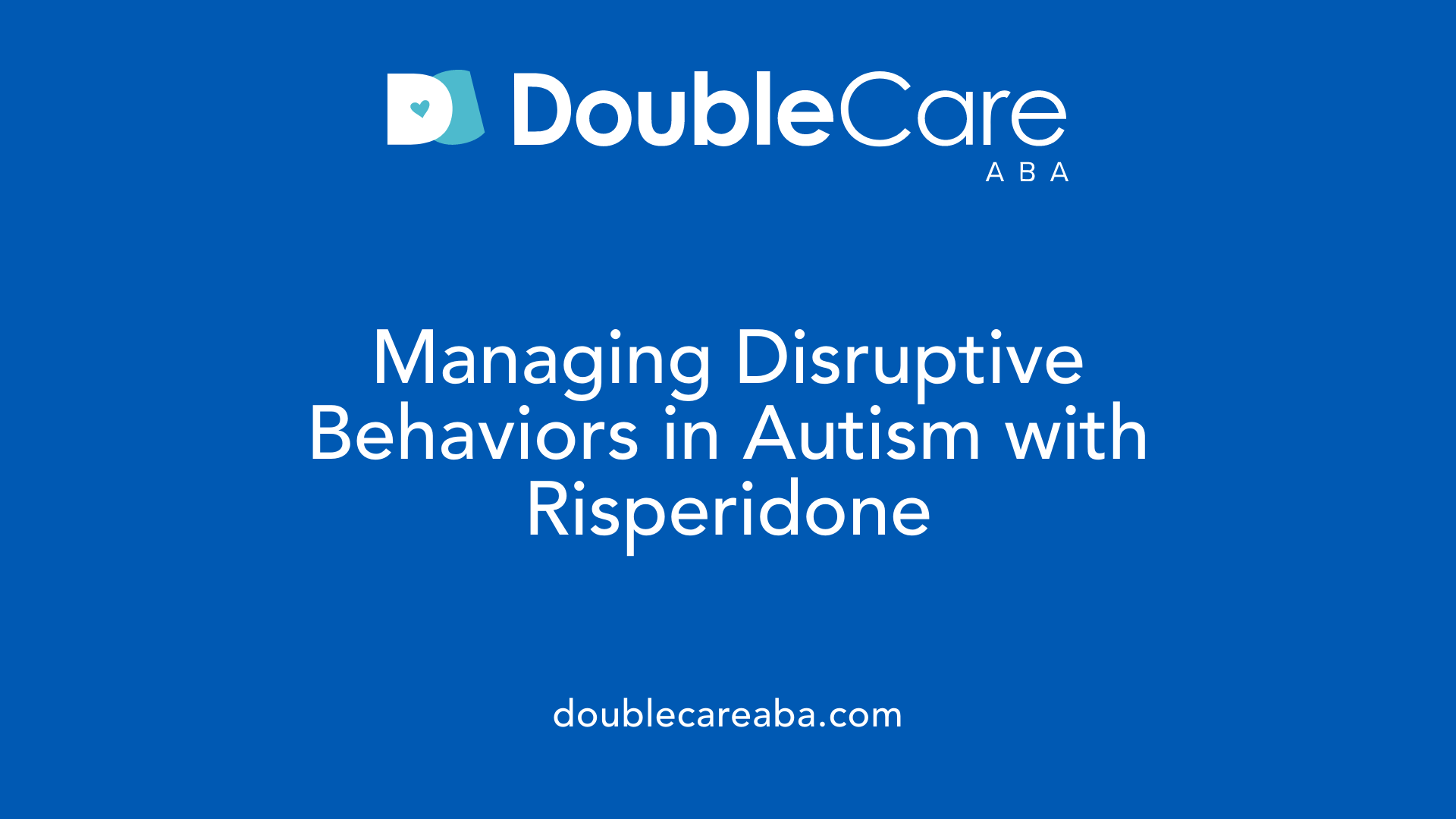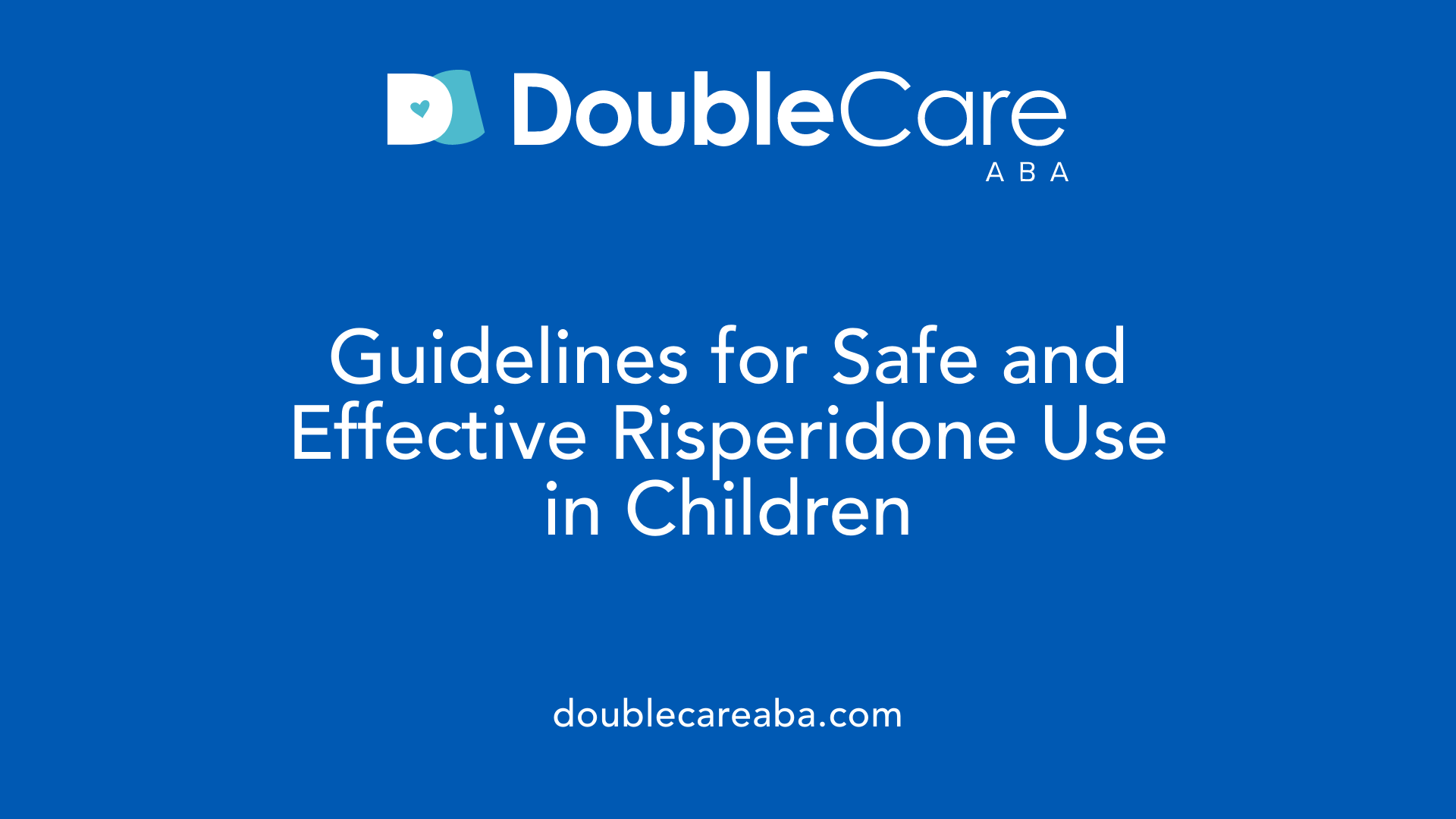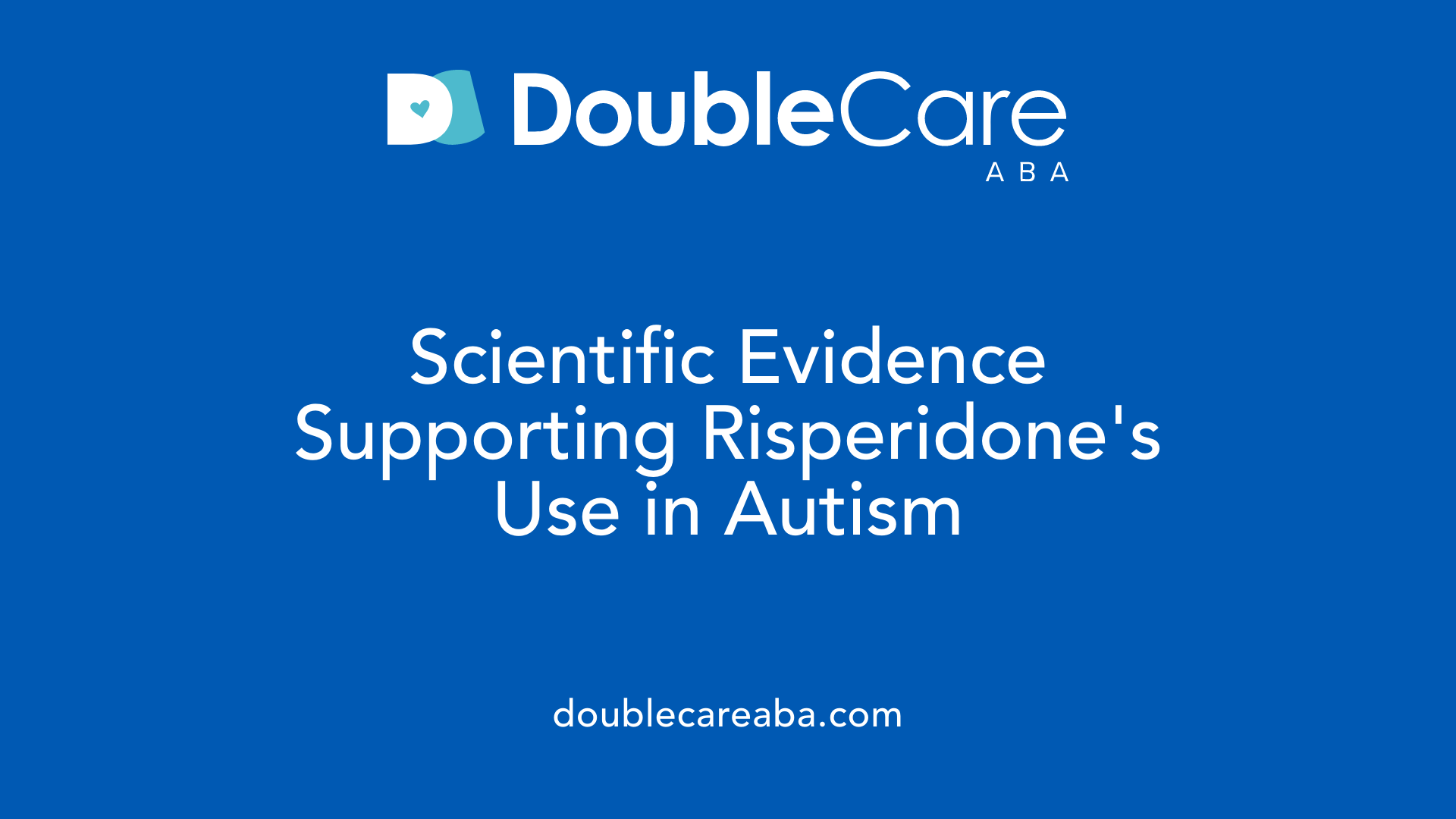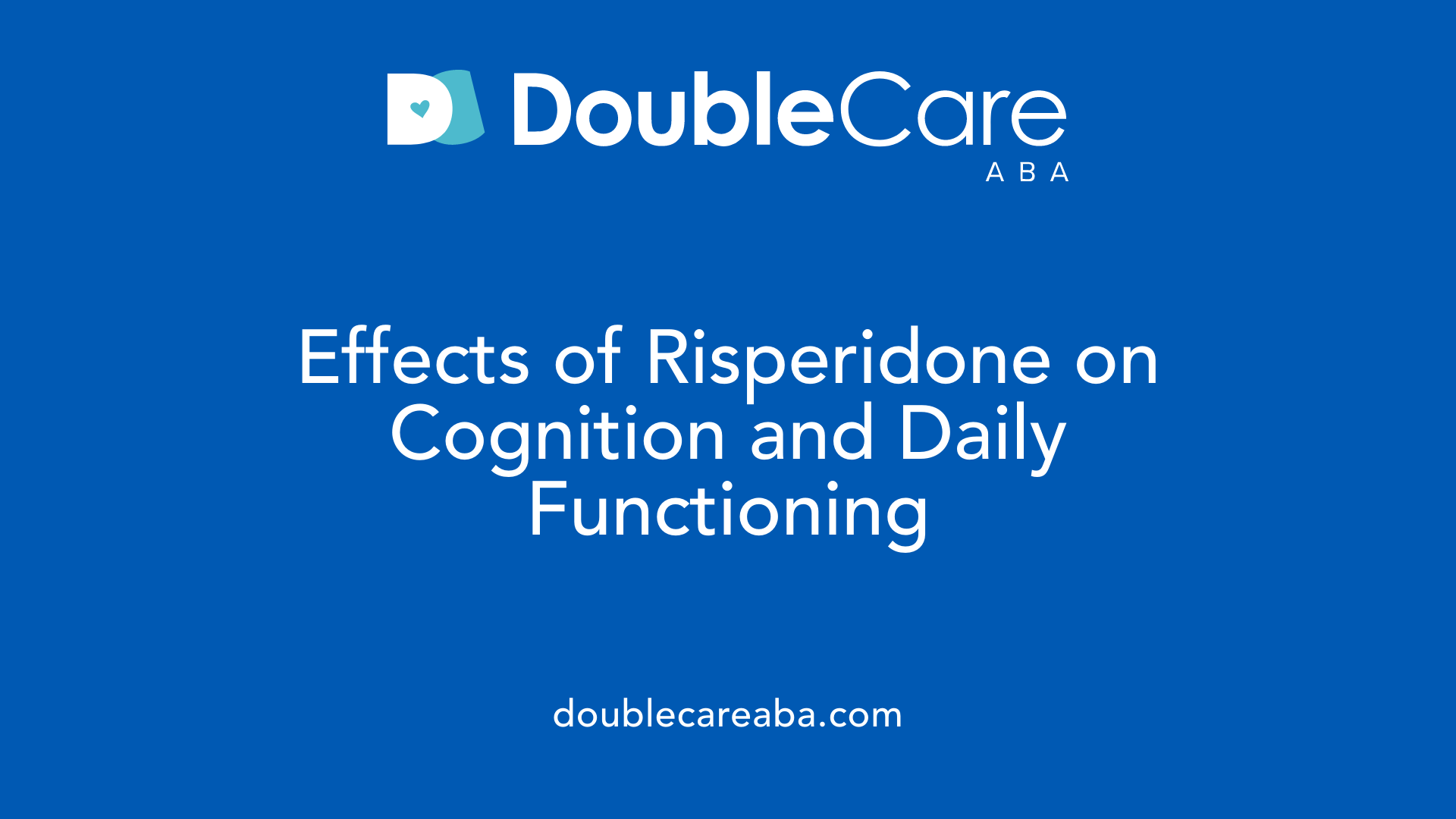Exploring Pharmacological Options for Autism Spectrum Disorder
Risperidone has established itself as a significant medication in managing behavioral symptoms associated with autism spectrum disorder (ASD). Since its FDA approval in 2006 for irritability in children and adolescents with ASD, it has become a cornerstone in pharmacotherapy for severe behavioral problems. This article delves into the scientific evidence regarding its safety and efficacy, usage guidelines, potential risks, and its effects on cognition and overall functioning.
Common Uses of Risperidone in Autism

What are the common uses of risperidone for managing behavioral problems in individuals with autism?
Risperidone is widely used to help manage several behavioral challenges associated with autism spectrum disorder (ASD). Its primary role is to reduce irritability, aggression, and self-injurious behaviors, which can be severe and impair daily functioning.
Children and adolescents with ASD often exhibit tantrums, hyperactivity, stereotypic behaviors, and inappropriate speech. Risperidone has been proven effective in decreasing these disruptive behaviors, making it easier for these individuals to participate in social and educational activities.
Research from clinical trials shows that after about eight weeks of treatment, many patients experience significant improvements. For instance, studies indicate a 56.9% reduction in irritability scores among children given risperidone compared to a 14.1% decrease with placebo.
While risperidone is not approved as a treatment for the core symptoms of autism—such as social communication deficits or restricted interests—it significantly alleviates associated behavioral issues. This allows for better engagement with therapy and daily routines.
The medication's role is especially crucial in cases where behavioral interventions alone do not produce sufficient improvements. With an approximate response rate of 70%, risperidone has become a valuable component in managing severe behavioral problems in autism.
Despite its benefits, risperidone use requires careful monitoring due to potential side effects. The most common are weight gain and mild sedation, which necessitate regular check-ups involving weight, height, prolactin levels, and metabolic parameters.
In summary, risperidone effectively controls many disruptive behaviors linked to ASD, thereby improving quality of life for affected individuals and their families. It is typically part of a comprehensive treatment plan that includes behavioral therapy and other interventions.
Prescribing Guidelines and Dosing Considerations in Children

Are there specific considerations for using risperidone in children, including dosing and administration?
When prescribing risperidone for children with autism spectrum disorder (ASD), healthcare providers must carefully consider appropriate dosing, administration methods, and the monitoring process. Dosing starts with low amounts tailored to the child's age and weight to minimize side effects and ensure safety.
For children over 10 years with schizophrenia or bipolar disorder, the typical starting dose is around 0.5 mg daily. The dose can be gradually increased by 0.5 to 1 mg at intervals of at least 24 hours, with the maximum dose usually not exceeding 6 mg daily. This cautious titration helps reduce adverse reactions such as sedation, weight gain, or movement disorders.
In children with ASD, initial doses vary depending on weight. Specifically, for those under 20 kg, the starting dose is generally 0.25 mg daily. For children over 20 kg, the starting dose is often 0.5 mg daily. The dose is increased gradually, generally to reach a typical target dose between 0.5 and 3 mg daily. The titration is usually done in increments of 0.25 to 0.5 mg, with intervals of at least one to two weeks, allowing adequate response assessment and side effect management.
Dosing adjustments should be based on individual response and tolerability, emphasizing the importance of ongoing clinical assessment. It is crucial to titrate slowly to mitigate risks such as weight gain, sedation, and extrapyramidal symptoms.
Regarding administration, risperidone is usually given orally, either as tablets, orally disintegrating tablets, or liquid formulations. Compliance can be enhanced by choosing the formulation that best suits the child's age, preferences, and ability to swallow pills.
Throughout treatment, children should be closely monitored for potential side effects. Regular assessments include measurement of weight, height, prolactin levels, blood sugar, and lipid profiles. Early detection of weight gain or metabolic issues enables timely intervention, such as dietary counseling or medication adjustment.
In summary, the use of risperidone in children requires specialized dosing strategies, careful titration, and vigilant monitoring to ensure safety and effectiveness. Close collaboration between healthcare providers, parents, and caregivers is essential for optimal outcomes.
Scientific Evidence for Safety and Efficacy

What is the evidence regarding the safety and efficacy of risperidone for treating autism spectrum disorder (ASD)?
Risperidone, an atypical antipsychotic medication, received FDA approval in 2006 specifically for managing irritability associated with ASD in children. Extensive research, including clinical trials and meta-analyses, supports its effectiveness in reducing irritability, aggression, hyperactivity, stereotypy, and other disruptive behaviors in children and adolescents. For instance, a prominent multisite, randomized, double-blind trial found that after eight weeks of treatment, 69% of children on risperidone experienced a positive response—defined as at least a 25% decrease in irritability scores—compared to only 12% on placebo. Similar improvements have been observed in adult populations with ASD, with notable reductions in repetitive behaviors, aggression, and anxiety.
Clinical studies demonstrate that both short-term and long-term use of risperidone lead to significant behavioral improvements. In children, benefits tend to manifest within approximately 8 weeks, with ongoing use often maintaining symptom control over longer periods. For example, some studies indicate that two-thirds of children who respond to risperidone maintain their benefits at six months, suggesting sustained efficacy with continued therapy.
Despite its benefits, risperidone’s safety profile must be carefully considered. The medication is associated with notable side effects, including significant weight gain—averaging 2.7 kg over eight weeks—along with increased waist circumference and disturbances in glucose and lipid metabolism. These side effects point to a risk of developing metabolic syndrome, diabetes, and cardiovascular issues, especially with long-term use. Hormonal alterations are also common, such as increased prolactin levels leading to symptoms like breast enlargement in boys and menstrual irregularities in girls.
While the short-term safety profile appears acceptable—with most adverse effects being mild or transient—there is limited long-term data confirming the safety of extended treatments. Therefore, close monitoring of patients is essential, including assessments of weight, height, prolactin levels, and blood sugar and lipid profiles.
Overall, the substantial body of evidence confirms that risperidone is a valuable medication for managing irritability and associated disruptive behaviors in ASD. It produces significant symptom reductions with a response rate of around 70% in children and adolescents. Nonetheless, benefits must be weighed against potential metabolic and neurological risks, emphasizing the importance of vigilant, ongoing monitoring during treatment.
Guidelines and Precautions in Prescribing Risperidone
What are the guidelines and considerations for prescribing risperidone for individuals with autism?
When considering risperidone for individuals with autism, healthcare providers must adhere to established prescribing practices to ensure safety and effectiveness. The initial dose depends on the child's weight: for children weighing less than 20 kg, the starting dose is typically 0.25 mg daily; for those 20 kg or more, it is generally 0.5 mg daily. The dose can be gradually increased within the effective range of 0.5 to 3 mg per day based on the child's response and tolerability.
Risperidone is FDA-approved for treating irritability associated with autism in children aged 5 and above. In the UK, it is the only psychotropic medication officially approved for behavioral disturbances in autism. Given its potential side effects, careful patient selection is crucial. Clinicians should evaluate the child's overall health, consider any existing comorbidities, and weigh the benefits against potential risks.
Regular and comprehensive monitoring is essential once treatment begins. This includes routine assessments of physical health parameters such as weight, height, and waist circumference, along with metabolic profiles—blood glucose, insulin, lipids—and hormonal levels, including serum prolactin. Cardiac health should be monitored through QTc interval measurements, especially given risperidone’s association with cardiac conduction issues.
Adjustments to the medication dosage should be made cautiously, usually by week 4 or as needed based on the child's response. Discontinuation or dose reduction may be necessary if adverse effects outweigh benefits. Essentially, the goal is to manage challenging behaviors like irritability and aggression while minimizing side effects.
Monitoring protocols
Implementing a structured monitoring protocol is vital. This involves baseline evaluations prior to starting risperidone, followed by regular follow-up appointments. Clinicians should monitor for weight gain, unusual movements, hormonal imbalances, and metabolic disturbances.
Children should be observed for signs of extrapyramidal symptoms such as tremors or rigidity, especially in the early weeks of treatment. Laboratory tests should include weight, height, prolactin levels, fasting blood glucose, lipid profile, and liver function tests. Electrocardiograms (ECGs) are recommended to check for QTc prolongation.
Parents and caregivers should be educated on observable side effects, such as excessive somnolence, drooling, or changes in behavior, to ensure prompt reporting and intervention.
Managing side effects
The most common adverse effects of risperidone include weight gain, increased appetite, sedation, and hormonal changes like elevated prolactin levels. Unintended hormonal effects may lead to symptoms such as galactorrhea or gynecomastia, particularly in boys. To manage these, clinicians should routinely monitor prolactin levels and observe for physical signs.
Weight gain and metabolic disturbances increase the risk for diabetes and cardiovascular issues. Early dietary counseling and promoting physical activity can help manage weight gain. In some cases, adjunct medications like metformin are considered to mitigate metabolic effects, though this should be approached carefully under specialist supervision.
Neurological side effects, such as extrapyramidal symptoms, should be promptly identified. If such symptoms occur, medication doses should be reduced or the drug discontinued. Switching to medications with a lower risk for these side effects, like aripiprazole, might be appropriate.
Legal and regulatory considerations
Legal actions and regulatory changes have emphasized the importance of cautious prescribing practices. Risperidone, marketed as Risperdal, has faced scrutiny over side effect profiles and marketing practices.
Clinicians should ensure informed consent is obtained, clearly communicating the potential risks and benefits to parents and guardians. Adherence to prescribing guidelines and regular follow-up is vital to meet regulatory standards.
In the UK, risperidone is approved for children under 18 with irritability in autism, and healthcare providers must comply with national regulations and protocols.
Monitoring and documentation are critical to demonstrate compliance and to provide medico-legal protection. Whenever possible, treatment should be part of a comprehensive behavioral management plan, with pharmacotherapy as an adjunct.
| Aspect | Considerations | Details |
|---|---|---|
| Dosage | Start low, titrate cautiously | 0.25 mg for <20 kg, 0.5 mg for ≥20 kg, up to 3 mg/day |
| Monitoring | Regular health assessments | Weight, height, waist, metabolic panel, prolactin, ECG |
| Side Effects | Awareness and management | Weight gain, hormonal changes, extrapyramidal symptoms |
| Legal | Informed consent and documentation | Follow national guidelines, patient safety protocols |
Utilizing these guidelines helps optimize the therapeutic benefits of risperidone while minimizing adverse effects and legal risks, ultimately providing safer care for individuals with autism.
Research on Risperidone in Preschool Children
What research findings are available concerning the use of risperidone in preschool children with autism?
Research examining the application of risperidone in very young children with autism spectrum disorder (ASD) suggests that it can be beneficial in managing severe behavioral issues like aggression and self-injury. Several studies have indicated that risperidone may effectively reduce irritability and improve other disruptive behaviors, with some findings showing greater improvements compared to placebo treatments.
One notable study involved a randomized controlled trial lasting about six months, which found that low-dose risperidone was generally well tolerated among preschool children aged around 2.5 to 5 years. Participants in this study experienced improvements in behavioral scales, though typical side effects such as weight gain and hypersalivation were observed. Importantly, no serious adverse reactions, including extrapyramidal symptoms or metabolic disturbances, were reported in this trial.
Retrospective reviews complement these findings, showing that risperidone can be used in early childhood, especially in cases of severe aggression or self-injury. However, due to the young age group, rigorous monitoring is critical, particularly for hormonal effects like increased prolactin levels and metabolic issues such as changes in blood glucose and lipids.
Meta-analyses that analyze multiple studies involving children and adolescents with ASD further support the role of risperidone in reducing core and associated symptoms like hyperactivity and stereotypy. Yet, these analyses also underscore the concern over side effects, predominantly weight gain and neurological effects, which require careful management.
Overall, the current evidence suggests that risperidone may be a valuable option for preschool children with severe behavioral challenges, provided that it is used with cautious dosing and ongoing monitoring. Nonetheless, the need for larger, more definitive studies remains clear to establish both safety and efficacy comprehensively in this very young population.
The ongoing research landscape points toward a cautious yet optimistic view of risperidone’s role in early childhood autism management, emphasizing the importance of balancing benefits with potential risks.
Impact on Cognition and Overall Functioning in Autism

How does risperidone affect cognition and overall functioning in individuals with autism?
Risperidone is primarily used to reduce irritability, hyperactivity, and behavioral challenges in people with autism spectrum disorder (ASD). A significant concern among clinicians and parents has been whether the medication impacts cognitive abilities and overall functioning.
According to multiple studies, risperidone does not impair cognition. Research involving children, adolescents, and some adults consistently shows that the drug does not negatively affect various cognitive domains such as attention, verbal learning, or memory. Instead, evidence suggests that risperidone may have a neutral or even slightly positive effect on some cognitive functions.
For example, short-term trials have demonstrated that individuals on risperidone perform better in verbal recognition tasks and respond more quickly compared to those on placebo. Other studies indicate no deterioration in motor coordination or hand-eye coordination tasks, reinforcing the idea that risperidone does not compromise neurological functions.
Some findings go further to suggest a subtle cognitive enhancement in certain areas. In particular, improvements in attentional focus and verbal learning have been observed, although these are modest and require further validation through larger, longer-term studies.
It is important to note that these observational data are generally derived from clinical trials with relatively small sample sizes and limited duration. Most existing research emphasizes short-term effects, which may not fully capture potential long-term impacts on cognition.
Safety remains a primary benefit, as risperidone effectively manages behavioral symptoms without obvious detriment to cognitive functioning. However, side effects such as weight gain, hormonal changes, and metabolic disturbances are concerns that warrant ongoing monitoring.
In summary, risperidone appears to be a safe option regarding cognitive health and can support the behavioral and social functioning of individuals with autism. Still, clinicians should continue to be attentive to potential side effects, and long-term studies are needed to definitively confirm these findings and explore any subtle cognitive influences.
Long-Term Risks and Monitoring

What are the potential side effects and long-term risks of risperidone in children and adults with autism?
Risperidone has proven effective in managing various behavioral challenges associated with autism spectrum disorder, such as aggression, irritability, and self-injury. However, prolonged use raises concerns about several long-term health effects.
One of the most notable adverse effects is significant weight gain. Studies show children and adults can experience an average increase of around 6 pounds within the first eight weeks, and this weight gain often continues with ongoing therapy. This increase in weight is not just cosmetic; it significantly raises the risk of metabolic syndrome, type 2 diabetes, high cholesterol, and cardiovascular diseases later in life.
The medication can also impact hormonal levels, notably increasing prolactin. Elevated prolactin may cause symptoms like nipple discharge, breast enlargement in boys (gynecomastia), and menstrual disturbances in girls. These hormonal effects are usually mild but warrant close clinical monitoring.
Neurological side effects—although less frequent—include movement disorders such as tardive dyskinesia and other extrapyramidal symptoms. While these are rare, they can be serious and sometimes irreversible. The risk is especially relevant with long-term use, emphasizing the importance of regular neurological assessments.
Metabolic abnormalities, including increased blood glucose and lipid levels, are common over extended periods of risperidone therapy. These changes can predispose individuals to insulin resistance and cardiovascular issues,
Effects on Repetitive Behaviors and Core Autism Symptoms
Impact on stereotypy and repetitive behaviors
Risperidone has been found effective in reducing stereotypic and repetitive behaviors in children and adolescents with autism spectrum disorder (ASD). Numerous clinical trials demonstrate that after about 8 weeks of treatment, there is a significant decline in behaviors such as hand-flapping, rocking, and insistence on sameness. For example, a multisite, randomized trial showed a 56.9% decrease in irritability scores, which also correlated with reductions in stereotypic behaviors.
These improvements contribute to better overall functioning and less disruptive behavior, making daily activities more manageable for caregivers and educators.
Effects on communication and social skills
While risperidone effectively manages irritability, aggression, and hyperactivity, its impact on core communication and social skills of individuals with autism appears limited. Studies suggest that risperidone does not directly improve language abilities or social reciprocity. However, some research indicates that managing disruptive behaviors can create a more conducive environment for social and communication interventions.
A meta-analysis noted that in addition to reducing behavioral disturbances, risperidone may have a modest effect on improving lethargy and apparently inadequate speech, although these are not primary targets of the medication.
Limitations regarding core symptom improvement
Despite its benefits for irritability and behavioral issues, risperidone does not alter the fundamental course of autism spectrum disorder. It is primarily used symptomatically and often in conjunction with behavioral therapies. Discontinuation of risperidone often results in the return of affected behaviors, indicating that the medication addresses symptoms rather than causes.
Furthermore, studies highlight that risperidone's effects on core symptoms like social communication and repetitive behaviors are modest at best, and it should be viewed as part of a comprehensive intervention plan rather than a cure.
| Aspect | Effectiveness Level | Additional Notes |
|---|---|---|
| Reducing stereotypy | Significant reduction in clinical trials | About 56.9% decrease in stereotypic behaviors observed |
| Improving communication | Limited and modest | Not a primary effect; better in supportive environments |
| Core symptom alteration | No significant change | Medications are secondary, adjunctive treatments |
| Long-term impact | Not extensively studied | Most data are short-term; needs further research |
How does risperidone affect cognition and overall functioning in individuals with autism?
Risperidone primarily improves irritability, hyperactivity, and behavioral issues in individuals with autism spectrum disorder (ASD), and evidence suggests it does not impair cognition. Multiple studies involving children, adolescents, and some adults indicate that risperidone has no detrimental effects on various cognitive domains such as attention, verbal learning, and memory; in some cases, cognitive performance may even improve slightly. Short-term research shows better performance on certain tasks like verbal recognition and response time on risperidone compared to placebo, with minimal or no adverse effects on other areas like hand-eye coordination. While most findings are positive, the majority of studies are limited by small sample sizes and short durations, highlighting the need for further long-term research. Overall, risperidone appears to be safe concerning cognition while also supporting behavioral management, though potential side effects like weight gain should be considered.
Summary and Future Directions in Risperidone Use for Autism
What research findings are available concerning the use of risperidone in preschool children with autism?
Research on risperidone use in preschool children with autism indicates that it may be effective in managing irritability and severe behavioral problems. Several studies have demonstrated that low-dose risperidone can lead to improvements in autism severity, especially when behavioral challenges such as aggression and self-injury are involved.
A notable randomized controlled trial spanning six months found that preschool children receiving risperidone experienced significant improvements with minimal serious adverse effects. This study reported common side effects such as weight gain and hypersalivation but no cases of serious health issues, suggesting that with proper monitoring, risperidone can be tolerable in young children.
Retrospective reviews further support these findings, indicating that children aged 2.5 to 5 years—especially those with particularly severe behaviors—can benefit from risperidone therapy. These reviews emphasize the importance of close monitoring for hormonal changes and metabolic effects, as risperidone can influence prolactin levels and lead to weight gain.
Meta-analyses encompassing children and adolescents with autism reveal that risperidone tends to reduce irritability, hyperactivity, and stereotypic behaviors. However, side effects such as weight gain and neurological effects remain considerations that require weighing against the benefits.
Despite promising results, this evidence underscores the need for larger, longer-term studies to confirm safety and clear guidelines for early age use. The current body of research supports careful, individualized treatment approaches but highlights gaps that future research must address for optimal utilization in preschool populations.
Balancing Benefits and Risks in Pharmacologic Management
Risperidone remains a vital medication in the pharmacological management of behavioral disturbances in autism spectrum disorder, particularly irritability and aggression. The extensive body of clinical trials and meta-analyses confirms its efficacy, with a response rate of approximately 70%. Nevertheless, potential side effects — especially weight gain, metabolic disturbances, hormonal changes, and neurological effects — necessitate rigorous, ongoing monitoring. While risperidone does not address core autism symptoms such as social communication deficits, it improves associated disruptive behaviors that significantly impact quality of life. The current evidence underscores the importance of personalized treatment plans, careful dosing, and vigilant safety protocols. Future research should focus on long-term effects, safer medication alternatives, and interventions that target core autism symptoms to provide more holistic management strategies.
References
- The Effects of Risperidone on Cognition in People With Autism ...
- What Parents Should Know About Risperdal - Child Mind Institute
- Effects of Risperidone in Autistic Children and Young Adults
- Risperidone (Risperdal) for Management of Autistic Disorder - AAFP
- New study on health risks of Risperidone: Your questions answered
- Olanzapine, risperidone, and aripiprazole use in children and ...
- Risperidone in Children with Autism and Serious Behavioral Problems
- Risperidone Use in Pre-School Children (≤5 Years) with Autism ...















